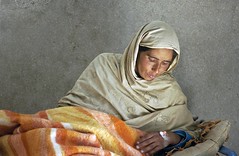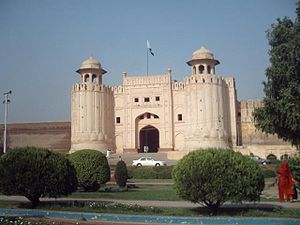Raymond Davis shot and killed two Pakistanis in Lahore through his car’s windshield. He claimed that he shot the two young men in self-defense. However, autopsy reports have revealed that the two men were shot multiple times in the back, while one dead body was found 30 feet away from Mr. Davis' car, suggesting that the person was trying to flee and not posing any threat to Mr. Davis. Hardly a matter of self-defense!
These recent revelations make it even harder for the United States to seek a diplomatic immunity for a person responsible for killing two individuals who at best is a spy, if not a mercenary working for a notorious American Security firm that has been found guilty of murdering numerous civilians in Iraq.
February 21, 2011
American Held in Pakistan Shootings Worked With the C.I.A.
By MARK MAZZETTI, ASHLEY PARKER, JANE PERLEZ and ERIC SCHMITT
This article was written by Mark Mazzetti, Ashley Parker, Jane Perlez and Eric Schmitt.
WASHINGTON — The American arrested in Pakistan after shooting two men at a crowded traffic stop was part of a covert, C.I.A.-led team of operatives conducting surveillance on militant groups deep inside the country, according to American government officials.
Working from a safe house in the eastern city of Lahore, the detained American contractor, Raymond A. Davis, a retired Special Forces soldier, carried out scouting and other reconnaissance missions as a security officer for a Central Intelligence Agency task force of case officers and technical surveillance experts, the officials said.
Mr. Davis’s arrest and detention, which came after what American officials have described as a botched robbery attempt, has inadvertently pulled back the curtain on a web of covert American operations inside Pakistan, part of a secret war run by the C.I.A. It has exacerbated already frayed relations between the American intelligence agency and its Pakistani counterpart, created a political dilemma for the weak, pro-American Pakistani government, and further threatened the stability of the country, which has the world’s fastest growing nuclear arsenal.
Without describing Mr. Davis’s mission or intelligence affiliation, President Obama last week made a public plea for his release. Meanwhile, there have been a flurry of private phone calls to Pakistan from Leon E. Panetta, the C.I.A. director, and Adm. Mike Mullen, chairman of the Joint Chiefs of Staff, all intended to persuade the Pakistanis to release the secret operative. Mr. Davis has worked for years as a C.I.A. contractor, including time at Blackwater Worldwide, the controversial private security firm (now called Xe) that Pakistanis have long viewed as symbolizing a culture of American gun slinging overseas.
The New York Times had agreed to temporarily withhold information about Mr. Davis’s ties to the agency at the request of the Obama administration, which argued that disclosure of his specific job would put his life at risk. Several foreign news organizations have disclosed some aspects of Mr. Davis’s work with the C.I.A.. On Monday, American officials lifted their request to withhold publication, though George Little, a C.I.A. spokesman, declined any further comment.
Since the United States is not at war in Pakistan, the American military is largely restricted from operating in the country. So the Central Intelligence Agency has taken on an expanded role, operating armed drones that kill militants inside the country and running covert operations, sometimes without the knowledge of the Pakistanis.
Several American and Pakistani officials said that the C.I.A. team in Lahore with which Mr. Davis worked was tasked with tracking the movements of various Pakistani militant groups, including Lashkar-e-Taiba, a particularly violent group that Pakistan uses as a proxy force against India but that the United States considers a threat to allied troops in Afghanistan. For the Pakistanis, such spying inside their country is an extremely delicate issue, particularly since Lashkar has longstanding ties to Pakistan’s intelligence service, the Directorate for Inter-Services Intelligence, or ISI.
Still, American and Pakistani officials use Lahore as a base of operations to investigate the militant groups and their madrasas in the surrounding area.
The officials gave various accounts of the makeup of the covert task force and of Mr. Davis, who at the time of his arrest was carrying a Glock pistol, a long-range wireless set, a small telescope and a headlamp. An American and a Pakistani official said in interviews that operatives from the Pentagon’s Joint Special Operations Command had been assigned to the group to help with the surveillance missions. Other American officials, however, said that no military personnel were involved with the task force.
Special operations troops routinely work with the C.I.A. in Pakistan. Among other things, they helped the agency pinpoint the location of Mullah Abdul Ghani Baradar, the deputy Taliban commander who was arrested in January 2010 in Karachi.
Even before his arrest, Mr. Davis’s C.I.A. affiliation was known to Pakistani authorities, who keep close tabs on the movements of Americans. His visa, presented to the Ministry of Foreign Affairs in late 2009, describes his job as a “regional affairs officer,” a common job description for officials working with the agency.
According to that application, Mr. Davis carried an American diplomatic passport and was listed as “administrative and technical staff,” a category that typically grants diplomatic immunity to its holder.
American officials said that with Pakistan’s government trying to clamp down on the increasing flow of Central Intelligence Agency officers and contractors trying to gain entry to Pakistan, more of these operatives have been granted “cover” as embassy employees and given diplomatic passports.
As Mr. Davis languishes in a jail cell in Lahore — the subject of an international dispute at the highest levels — new details are emerging of what happened in a dramatic daytime scene on the streets of central Lahore, a sprawling city, on Jan. 27.
By the American account, Mr. Davis was driving alone in an impoverished area rarely visited by foreigners, and stopped his car at a crowded intersection. Two Pakistani men brandishing weapons hopped off motorcycles and approached. Mr. Davis killed them with the Glock, an act American officials insisted was in self-defense against armed robbers.
But on Sunday, the text of the Lahore Police Department’s crime report was published in English by a prominent daily newspaper, The Daily Times, and it offered a somewhat different account.
It is based in part on the version of events Mr. Davis told Pakistani authorities, and it seems to raise doubts about his claim that the shootings were in self-defense.
According to that report, Mr. Davis told the police that after shooting the two men, he stepped out of the car to take photographs of one of them, then called the United States Consulate in Lahore for help.
But the report also said that the victims were shot several times in the back, a detail that some Pakistani officials say proves the killings were murder. By this account, after firing at the men through his windshield, Mr. Davis stepped out of the car and continued firing. The report said that Mr. Davis then got back in his car and “managed to escape,” but that the police gave chase and “overpowered” him at a traffic circle a short distance away.
In a bizarre twist that has further infuriated the Pakistanis, a third man was killed when an unmarked Toyota Land Cruiser racing to Mr. Davis’s rescue, drove the wrong way down a one-way street and ran over a motorcyclist, killing him. As the Land Cruiser drove “recklessly” back to the consulate, the report said, items fell out of the vehicle, including 100 bullets, a black mask and a piece of cloth with the American flag.
Pakistani officials have demanded that the Americans in the S.U.V. be turned over to local authorities, but American officials say they have already left the country.
Mr. Davis and the other Americans were heavily armed and carried sophisticated equipment, the report said.
The Pakistani Foreign Office, generally considered to work under the guidance of the ISI, has declined to grant Mr. Davis what it calls the “blanket immunity” from prosecution that diplomats enjoy. In a setback for Washington, the Lahore High Court last week gave the Pakistani government until March 14 to decide on the issue of Mr. Davis’s immunity.
The pro-American government led by President Asif Ali Zardari, fearful for its survival in the face of a surge of anti-American sentiment, has resisted strenuous pressure from the Obama administration to release Mr. Davis to the United States. Some militant and religious groups have demanded that Mr. Davis be tried in the Pakistani courts and hanged.
Relations between the two spy agencies were tense even before the episode on the streets of Lahore. In December, the C.I.A.’s top clandestine officer in Pakistan hurriedly left the country after his identity was revealed. Some inside the agency believe that ISI operatives were behind the disclosure — retribution for the head of the ISI, Lt. Gen. Ahmed Shuja Pasha, being named in a New York City lawsuit filed in connection with the 2008 terror attack in Mumbai, in which members of his agency are believed to have played a role. I.S.I. officials denied that was the case.
One senior Pakistani official close to the ISI said Pakistani spies are particularly infuriated over the Davis episode because it was such a public spectacle. Besides the three Pakistanis who died at the scene, the widow of one of the victims committed suicide by swallowing rat poison.
Moreover, the official said, the case was embarrassing for the ISI for its flagrancy, revealing how much freedom American spies have to roam around the country.
“We all know the spy-versus-spy games, we all know it works in the shadows,” the official said, “but you don’t get caught, and you don’t get caught committing murders.”
Mr. Davis, burly at 36, appears to have arrived in Pakistan in late 2009 or early 2010. American officials said he operated as part of the Central Intelligence Agency’s Global Response Staff in various parts of the country, including Lahore and Peshawar.
Documents released by Pakistan’s foreign office show that Mr. Davis was paid $200,000 a year, including travel expenses and insurance.
He is a native of rural, southwest Virginia, described by those who know him as an unlikely figure to be at the center of international intrigue.
He grew up in Big Stone Gap, a small town named after the gap in the mountains where the Powell River emerges.
The youngest of three children, Mr. Davis enlisted in the military after graduating from Powell Valley High School in 1993.
“I guess about any man’s dream is to serve his country,” said his sister Michelle Wade.
Shrugging off the portrait of him as an international spy comfortable with a Glock, Ms. Wade said: “He would always walk away from a fight. That’s just who he is.”
His high school friends remember him as good-natured, athletic, respectful. He was also a protector, they said, the type who stood up for the underdog.
“Friends with everyone, just a salt of the earth person,” said Jennifer Boring, who graduated from high school with Mr. Davis.
Mr. Davis served in the infantry in Europe — including a short tour as a peacekeeper in Macedonia — before joining the Third Special Forces Group in 1998, where he remained until he left the Army in 2003. The Army Special Forces —known as the Green Berets — are an elite group trained in foreign languages and cultures and weapons.
It is unclear when Mr. Davis began working for the C.I.A., but American officials said that in recent years he worked for the spy agency as a Blackwater contractor and later founded his own small company, Hyperion Protective Services.
Mr. Davis and his wife have moved frequently, living in Las Vegas, Arizona and Colorado.
One neighbor in Colorado, Gary Sollee, said that Mr. Davis described himself as “former military,” adding that “he’d have to leave the country for work pretty often, and when he’s gone, he’s gone for an extended period of time.”
Mr. Davis’s sister, Ms. Wade, said she has been praying for her brother’s safe return.
“The only thing I’m going to say is I love my brother,” she said. “I love my brother, God knows, I love him. I’m just praying for him.”
Eric Schmitt and Mark Mazzetti reported from Washington, Jane Perlez from Pakistan and Ashley Parker from Big Stone Gap, Va. Ismail Khan contributed reporting from Peshawar, Pakistan, and Waqar Gillani from Lahore, Pakistan.
 Cover of Rahat Fateh Ali KhanBetween the grain robbers in India, who are stealing from the most vulnerable, and Rahat Fateh Ali Khan of Pakistan, the millionaire tax cheat with a golden voice, the breadth of governance challenges in South Asia are explicitly exposed. At one end are the millionaires who are not even regiostered as tax payers in Pakistan. On the other hand are the state functionaries who steal the subsidised food for the very poor.
Cover of Rahat Fateh Ali KhanBetween the grain robbers in India, who are stealing from the most vulnerable, and Rahat Fateh Ali Khan of Pakistan, the millionaire tax cheat with a golden voice, the breadth of governance challenges in South Asia are explicitly exposed. At one end are the millionaires who are not even regiostered as tax payers in Pakistan. On the other hand are the state functionaries who steal the subsidised food for the very poor.












